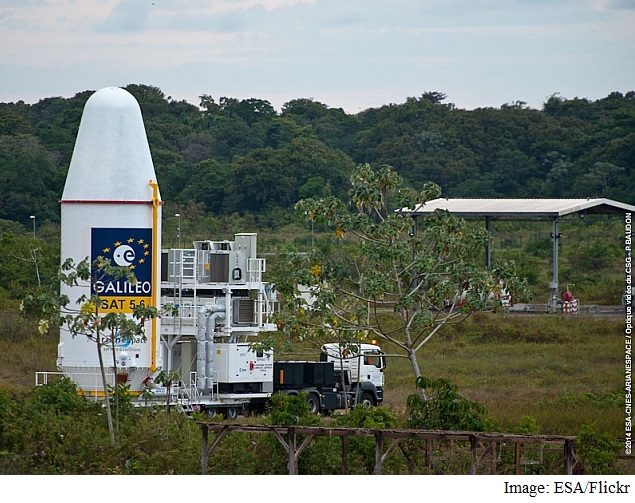- Home
- Science
- Science News
- EU to Launch 4 More Galileo Navigation Satellites in 2015
EU to Launch 4 More Galileo Navigation Satellites in 2015

Four more satellites will be launched this year for the European Union's (EU) indigenous satellite navigation programme, Galileo, the EU has said, following the successful launch of two satellites last week.
The next launch of Galileo satellites was scheduled for September 2015, the European Commission (EC) stated, according to a Xinhua report on Sunday.
The EC aims to ensure initial Galileo services by 2016 and full services by 2020.
The EU's Galileo satellite navigation system now has eight satellites in orbit following the launch of the latest pair on Friday night.
Friday's launch represented the resumption of Galileo satellite flights after two satellites launched in August 2014 were delivered to a wrong orbit.
Once completed by the end of 2020, the Galileo system will consist of 30 satellites and the necessary ground infrastructure to control the satellites and enable positioning, navigation and timing services.
The Galileo system is fully financed out of the EU budget and the EU will spend EUR 7 billion (about $7.62 billion) on satellite navigation, according to the EC.
In 2013, the annual global market for navigation satellite products and services was valued at 175 billion euros (nearly $190.6 billion). It is expected to grow over the next years to an estimated EUR 237 billion (nearly $258.1 billion) in 2020.
For the latest tech news and reviews, follow Gadgets 360 on X, Facebook, WhatsApp, Threads and Google News. For the latest videos on gadgets and tech, subscribe to our YouTube channel. If you want to know everything about top influencers, follow our in-house Who'sThat360 on Instagram and YouTube.
Related Stories
- Samsung Galaxy Unpacked 2025
- ChatGPT
- Redmi Note 14 Pro+
- iPhone 16
- Apple Vision Pro
- Oneplus 12
- OnePlus Nord CE 3 Lite 5G
- iPhone 13
- Xiaomi 14 Pro
- Oppo Find N3
- Tecno Spark Go (2023)
- Realme V30
- Best Phones Under 25000
- Samsung Galaxy S24 Series
- Cryptocurrency
- iQoo 12
- Samsung Galaxy S24 Ultra
- Giottus
- Samsung Galaxy Z Flip 5
- Apple 'Scary Fast'
- Housefull 5
- GoPro Hero 12 Black Review
- Invincible Season 2
- JioGlass
- HD Ready TV
- Laptop Under 50000
- Smartwatch Under 10000
- Latest Mobile Phones
- Compare Phones
- Tecno Camon 40 Premier 5G
- Infinix Note 50 Pro+
- Infinix Note 50 Pro
- Infinix Note 50
- Vivo T4x 5G
- Nubia Neo 3 GT 5G
- Nubia Neo 3 5G
- Realme 14 Pro Lite 5G
- Tecno Megabook S14
- Apple MacBook Air 15-inch (M4, 2025)
- Apple iPad (2025) Wi-Fi + Cellular
- Apple iPad (2025) Wi-Fi
- boAt Ultima Prime
- boAt Ultima Ember
- Haier M95E
- Sony 65 Inches Ultra HD (4K) LED Smart TV (KD-65X74L)
- Sony PlayStation 5 Pro
- Sony PlayStation 5 Slim Digital Edition
- Blue Star 1.5 Ton 3 Star Inverter Split AC (IC318DNUHC)
- Blue Star 1.5 Ton 3 Star Inverter Split AC (IA318VKU)















